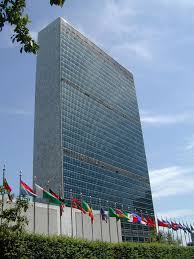Michael Curtin is a graduate student at the School of Diplomacy specializing in International Organizations and International Security. He is also an Associate Editor with the Journal of Diplomacy and International Relations.
With World War II still fresh on the minds of many Americans, President Harry S. Truman addressed the United Nations Conference in San Francisco on June 26, 1945. It was on this day that the U.N. Charter was signed, and several months later, on October 24, 1945, the Charter took effect as it was formally ratified by the five permanent members of the Security Council (the United States, Great Britain, France, the Soviet Union, and the Republic of China).
Following World War II, citizens were looking for some hope after years of conflict and bloodshed; President Truman delivered that hope with his signing of the U.N. Charter. October 24th has come to be known as U.N. Day, and it continues to be celebrated across our nation and the world.
U.N. Day is always an excellent opportunity to review the many accomplishments the global body has achieved in its seventy-one-year history. This international organization has withstood the test of time despite the many calls by its critics for its elimination.
The U.N. seeks to promote cooperation between its member states in several important areas such as economics, development, human rights, the environment, and political freedom. These core beliefs continue to remain the bedrock principles of the global institution.
An ever-burgeoning global population places greater demands on the world’s food supply. The global food arm of the U.N., the World Food Program, is tasked with the responsibility of assisting states who are pressured by food security issues. An important statistic of note is that each year the World Food program feeds over 100 million people in 80 countries who desperately require food assistance as the result of conflict, natural disasters, and health emergencies. No matter the crisis, the World Food Program is on the frontlines providing the necessities of life for those in need.
A story that rarely escapes the front page of a morning newspaper is the refugee crisis spawned because of the conflict continuing to boil over in Syria. Many innocent civilians are caught in the crosshairs of this war and require much needed assistance. Who will help them? It is the Office of the U.N. High Commissioner for Refugees (UNHCR) who takes center stage in such dire circumstances. Since its founding in 1949, UNHCR has assisted 17 million asylum-seekers and refugees. The problem is not unique, however, to Syria alone; for conflicts in Mali, Sudan, the Democratic Republic of the Congo (DRC) are hotspots also requiring UNHCR’s help.
One U.N. agency that is more well-known than perhaps others is the United Nations Children’s Fund (UNICEF) whose sole responsibility is to help children. Through its work, UNICEF has increased the living standards of children worldwide and has also reduced the number of deaths of children under the age of 5 by 50%. This is remarkable progress, but admittedly more work is needed to be done in this area.
There are other issues worth noting that do not always garner the headlines or are the lead story on the evening newscast; however, the U.N is one institution that will not let the victims of such matters have their voices silenced. With respect to human trafficking and modern-day slavery, the U.N. Office on Drugs and Crime (UNODC) issues an annual report highlighting the problem. UNODC has taken more concrete steps to address the issue by developing a “database on human trafficking case law”, which allows law enforcement agencies the ability to track the perpetrators who engage in such heinous activity.
There are also significant economic benefits derived from the presence of the U.N. in New York City. A 2015 study by the NYC Mayor’s Office of International Affairs pegs the “annual economic output generated by UN-related workers totals more than $2.3 billion.” This is certainly a figure critics of the U.N. can wrap themselves around.
President Truman had a vision seventy-one years ago, and his foresight remains a vital part of the post-World War II world. The U.N. must continue to remain actively engaged in many of the global hotspots because their loyal and dedicated staff travel to areas where others would dare not tread.
-Michael Curtin
